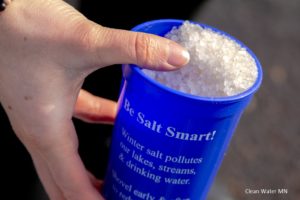New resources for cities to reduce chloride pollution
 Cities across Minnesota are working to reduce chloride pollution to lakes and streams. Chloride is a common ingredient in road salts and other deicers. Reduction in chloride usually happens by reducing road salt use or by reducing salty discharges to city wastewater treatment plants. The Nine Mile Creek Watershed District partnered with the MPCA, and several local cities and watershed organizations to develop these new resources:
Cities across Minnesota are working to reduce chloride pollution to lakes and streams. Chloride is a common ingredient in road salts and other deicers. Reduction in chloride usually happens by reducing road salt use or by reducing salty discharges to city wastewater treatment plants. The Nine Mile Creek Watershed District partnered with the MPCA, and several local cities and watershed organizations to develop these new resources:
- Suite of model ordinances to regulate deicers
- Guide for a water softener rebate program
The model ordinance serves as guidance for municipal officials who want direction in regulating the use of deicers. Instituting regulations can help to protect water quality, animals, human health and infrastructure. The development team adapted language from existing code from mid-western localities, along with the MPCA’s Smart Salting and deicer management guidance.
The rebate program guide is for city or watershed staff who have determined that water softeners are a significant source of the chloride load to their wastewater treatment facility. The guide covers the general steps for developing a program to offer residents a rebate for optimizing, upgrading or removing their water softeners.
For additional resources, please visit the Statewide chloride resources webpage or contact Brooke Asleson, MPCA water pollution prevention coordinator, at 651-757-2205 or brooke.asleson@state.mn.us.
